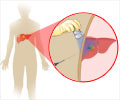
‘T cell therapy were engineered to carry HBV-specific T cell receptors (TCRs) showed clinical effectiveness in a patient with hepatitis B surface antigen (HBsAg)-negative HCC metastases.’
Tweet it Now
'We hypothesized that HBV transcriptomic profiles of HCC cells could guide the selection of HBV-specific TCRs to be used in engineering T cells for HCC-targeted immunotherapy.' explained Dr Anthony Tan from the Emerging Infectious Diseases Programme at Duke-NUS Medical School in Singapore, the lead author of the study. 'We first had to test if short, integrated HBV DNA fragments in tumour cells can produce HBV epitopes recognized by cytotoxic T cells'. Characterization of the expression of short, specific regions of integrated HBV DNA in natural HBV-related HCC lines negative for serological markers of HBV infection identified HBV epitopes that were functionally presented on the cell surface. These HCC cells could be lysed in vitro by T cells engineered to express TCRs specific for the epitopes that had been identified. A similar analysis was able to identify a region of HBV envelope encoded by integrated HBV DNA fragments derived from the primary HCC of a liver transplant patient with HBsAg-negative HCC metastases in the lungs. The TCR specific for this HBV envelope region was introduced into T cells using mRNA electroporation. Multiple adoptive transfers of the resulting HBV-specific TCR T cells into the patient were performed over a period of 6 months.
No therapy-related adverse events were observed, and computed tomography imaging performed before and during therapy showed an objective positive response with a volumetric reduction of nearly all lung lesions detected, with no new lesions detected in the lung or liver to date. As of January 2018, the tumour lesions in the lung remain stable.
'The use of mRNA electroporation for exogenous TCR expression reduces the potential toxicity of this approach compared with previous techniques using viral vectors,' said Dr Tan. 'Further development of this new immunotherapeutic strategy may offer new hope of a cure for HCC'.
'This study further explores the potentially beneficial role of immunotherapy in the management of advanced HCC', said Prof. Alejandro Forner from the Hospital Clinic Barcelona, Spain, and EASL Governing Board Member. 'With this interesting approach, the authors have been able to develop a personalized T cell adoptive immunotherapy for patients with HBV-related HCC with promising signs of clinical effectiveness. Further studies will be needed to confirm that this strategy is a viable option for patients'.
Advertisement
Source-Eurekalert












